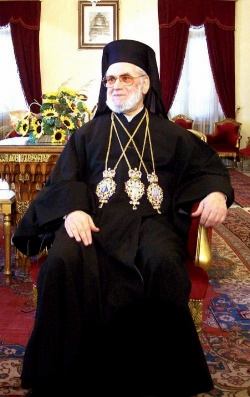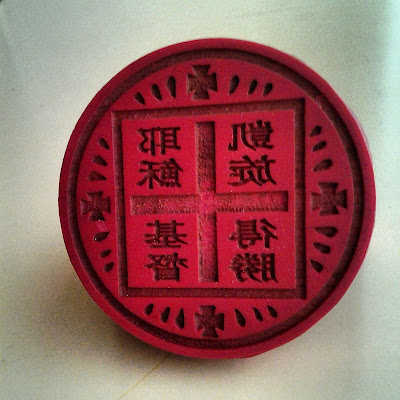
A Lutheran friend of mine decided to give me guff this morning about the Feast of the Dormition, particularly focusing on the Apolytikion (Dismissal Hymn). I got the usual "talking points"--it's not Scriptural, Mary's no different than the rest of us, invoking saints is bad, etc. I don't think he actually read the hymn's text which I posted in Greek (if he knows any Greek, I'd be surprised; Lutherans are particularly weak on language). I'm going to go through the hymn line by line and I would encourage anyone (especially my Lutheran friends) to find anything objectionable:
Ἐν τῇ Γεννήσει τὴν παρθενίαν ἐφύλαξας. Translation: In birth-giving, you guarded your virginity. Was Mary not a Virgin when she gave birth to Christ? Did not the Prophets prophesy that it was a virgin who would be the Mother of God? See Isaiah 7:4 and then the fulfillment in Matthew 1:22-23 which quotes Isaiah (Septuagint version) directly.
This does not address the issue of the semper virgo, whether Mary was ever-virgin. Of course, we Orthodox do believe that Mary was ever-virgin as did the Luther. In the Lutheran confessions, she is always referred to as semper virgo. I don't understand how something from the confessions which demands a quia subscription by Lutheran pastors AND laity is now reduced to a "pious opinion." But, I digress...
ἐν τῇ Κοιμήσει τὸν κόσμον οὐ κατέλιπες Θεοτόκε. Translation: And in your Dormition, you did not forsake the world, O Theotokos (God-bearer). The unnecessary categorical distinction between the church militant and the church triumphant only causes confusion. Does not St. Paul say that in Christ shall be made alive? (1 Cor 15:22). Doesn't that even extend to those who are no longer in the world (ο κοσμος)? If not, why not? The saints make intercession for this world though they are no longer of this world, having been changed. If it is considered good and worthy to ask for your friends and family to pray to God on your behalf, why not for those saints to do so?
Now, with regards to the term Theotokos, most appropriately translated as God-bearer, but sometimes erroneously translated as Mother of God, this term has been applied to Mary for as long as there has been a Church catholic. The term is not found in Scripture, but there can be no doubt (especially from the long introduction of the Gospel of St. John that the Jesus is BOTH man and God, Thenanthropos) that whom Mary gave birth to was God, born in the flesh. The term Theotokos came under assault by Nestorius, Patriarch of Constantinople, who, desiring to protect the honour and integrity of the God-head, favored the term Christotokos--Christ-bearer. But such a description would divide Christ into two persons and we know (from Scripture) that the members of the Trinity are individual persons. Nestorius was rebuked at the Council of Ephesus in 431 A.D. though he still has followers in the Middle East. (I believe the Jacobites in India are Nestorian as are the Assyrian Church--I'll have to check that). Lutherans accept the 7 ecuemnical councils because, according to them, they agree with Scripture. Calling Mary only Mother of Jesus is Nestorian and too many Lutherans have unfortunately accepted this as correct and that is heretical.
Μετέστης πρὸς τὴν ζωήν, translation: Thou wast translated to life. A note first about translation. The verb is active, but rendered here passively. It's not intended to be reflexive for that would imply she went into the heavens by her own power, which is not held in Orthodox theology. This was simply the best way to render it into English.
The Greek prefix μετα implies material change. And doesn't St. Paul say that we shall all be changed when we enter into our Lord's glory. Mary is glorified because of the glory that her Son gives to her.
μήτηρ ὑπάρχουσα τῆς ζωῆς, Translation: Being the mother of life. This is pretty self explanatory. Mary is not only the mother of God, but God is the author of our life. There are a myriad of Scriptural references on that.
καὶ ταῖς πρεσβείαις ταῖς σαῖς λυτρουμένη, ἐκ θανάτου τὰς ψυχὰς ἡμῶν. Translation: delivering by thine intercessions our souls from death. In many churches, the participle λυτρουμενη is rendered as an imperative verb. You will hear "Deliver our souls from death" which is not correct. So instead of merely describing what Mary is doing, it looks like an invocation which rubs Lutherans and other Protestants the wrong way. Of course, we Orthodox do not shy away from invoking the saints and asking for their prayers (see above), but, there is none of this here.
Lutherans will say that there is no doubt that the saints intercede for us. See Revelation 8:3-4 for example. So, why then the objection to this hymn? The hymn restates the fact that the saints (all of them, both in the world and in the heavens) pray for us and probably pray for any number of things for us. And why shouldn't those prayers include deliverance from death (i.e. the Devil and his ways)?
There should be nothing objectionable to this hymn from Lutherans, none at all. It fulfills your artificial criterion of Scriptural support, even though there is much more to Mary and the saints in our theology than just this hymn which may or may not find direct Scriptural support. But, what is more significant is that many Scriptural "proofs" do exist for other doctrines and beliefs that Lutherans find objectionable, but those Scriptures were removed by Luther. These are the so-called Apocrypha which include books like Sirach, Tobit, III Maccabees, etc. Luther excised those because he didn't like that they actually supported doctrines that he himself didn't like. Luther wasn't only trying to correct abuses that had snuck into the Medieval Catholic church and return the church to the doctrinal purity of the apostles or those following, but wanted to purge doctrines that he himself hated because Luther thought that he was above the church despite the Scripture that it is the Church which is the guardian and bulwark of Truth, not the Bible.
I again challenge how this hymn could be objectionable. Of course, debate over doctrine is generally fruitless and futile so I'm sure that if I do receive anything, it will be more in the form of polemic and invective.
.jpg)













